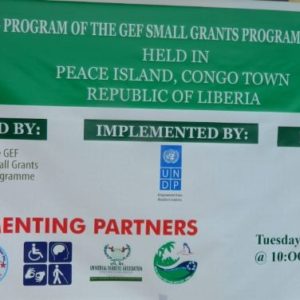PHOTO: Beneficiaries of the UNDP Global Environment Facility Small Grants Program at Peace Island closing on Tuesday
By Wremongar Joe, Wremongarjoe@gmail.com
UNDP Liberia and community based civil society groups are urging the government and People of Liberia to take concrete steps aimed at protecting Liberia’s biodiversity.
The groups said conservation of the country’s environment, biodiversity as well as smart climate action can serve as key indicators of the country’s health ecosystem as variety of species will cope better with threats than a limited number of them in large populations.
The United Nations Development Program, local NGOs and community based enterprises believe even if certain species in Liberia are affected by pollution, climate change or human activities, the ecosystem when protected as a whole may adapt and survive but adversely. The extinction of a species may have unforeseen impacts, sometimes increasing into the destruction of entire bionetworks.
The call to protect Liberia’s environment, animal, plant species came on Tuesday, as the ‘Implementing Groups’ of the Global Environment Facility Small Grants Program climaxed an eight-month training cycle for five local NGOs in Monrovia.
The Global Environment Facility Small Grants Program provides financial and technical support to communities and Civil Society Organizations to enable them meet the overall objective of global environmental benefits secured through community-based initiatives and actions.
Local NGOs and CBEs have for years been using small grant funding from the UNDP administered GEF Small Grants Program to tackle head-on biodiversity, climate change mitigation and adaptation, land degradation and sustainable forest management, international waters and chemicals in various counties across Liberia.
Speaking at the joint closure of the eight months grant period in Peace Island Community on Tuesday, UNDP Liberia Program Officer Gboryonon Williams encouraged the beneficiaries to make the maximum of the knowledge acquired.
“Liberia’s future depends on you, you must make use of the knowledge acquired to be able to change the situation in your communities” Williams said.
She expressed optimism over the continuation of the project as according to her, the GEF-SGP Liberia Office is impressed with the level of work done by the implementing groups and the beneficiary organizations.
The GEG-SGP she stressed is mainly concern about “how global climate change affects the environment” and is pleased that the five implementing local CBEs in Liberia were able to complete “intensive training for eight months in various areas including, waste management, agriculture, environment” among others.

Local NGOs and CBEs have for years been using small grant funding from the UNDP administered GEF Small Grants Program to tackle head-on biodiversity
Some of the local NGOs who implemented the 8-months grant include the United Farmers Association (UFA), Ever Green Recycling Institute (EVGRI), Raising Godly Generation INC (RGGI) etc.
Youth Climate Change Initiative Liberia (YCCI-Liberia), one of the five local implementing partners has been involved with awareness raising in host communities of the Mesurado Wetland, to present further destruction of mangroves in the face of massive encroachment.
YCCI-Liberia under the project is also working in Grand Cape Mount’s Robertsport City to provide alternative livelihood or income solution to those cutting mangrove trees as to make living.
“We are forever grateful to UNDP Liberia for this grant. It has not just helped enhance awareness in communities, but also contributed to Liberia’s efforts aimed at achieving greater climate action which is focused on adaptation and mitigation of climate change impact on our vulnerable people” – YCCI-Liberia Executive director Edwin Mendscole.
The project thought short, he said has achieved progressive knowledge sharing experiences with Liberians living at the margin of society and “even those of them affected by the impact of climate change without them being aware”.
Said Williams: “UNDP is committed to supporting local NGOs, CSOs in Liberia to empower and equip you because climate change and environmental degradation don’t just affect Liberia but the world”.
Mrs. Williams is also urging local groups to take advantage of the “called for proposal” put out regularly by the UNDP as “it will provide them funding to conduct training for members and others” and at the same time “prepared you for bigger opportunities.”
Under the grant, UFA worked in Todee Montserrado County to advance sustainable agricultural practice while Evergreen has recycled plastic wastes to prevent pollution.
Raising Godly Generation Incorporated was involved with dealing with prevention of substance abuse, rehabilitation of drug ridden youths, and provision of safe homes for drug users.
Beneficiaries of the various initiatives under the grant project said it was their “story of change” and lauded UNDP for making available funding for the training that adds values to their lives.
Launched in 1992 with 33 participating countries, the Small Grants Program was expanded to provide assistance to 125 countries currently.
It believes that community-driven and civil society-led initiatives can generate environmental benefits while supporting sustainable livelihoods gender equality and civil society empowerment.
SGP in says it recognizes that environmental degradation such as the destruction of ecosystems and the species that depend upon them, increasing levels of carbon dioxide and other greenhouse gases in our atmosphere, pollution of international waters, land degradation and the spread of persistent organic pollutants are life-threatening challenges that endanger us all.
However, poor and vulnerable communities –SGP’s primary stakeholders- are most at risk because they depend on access to natural resources for their livelihoods and often live in fragile ecosystems.
The program regularly provides grants of up to $50,000 or less directly to local communities including indigenous people, community-based organizations and other non-governmental groups for projects in Biodiversity, Climate Change Mitigation and Adaptation, Land Degradation and Sustainable Forest Management, International Waters and Chemicals.

